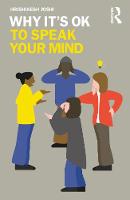Why It's OK to Speak Your Mind

Book Details
- Publisher : Routledge
- Published : 2021
- Cover : Paperback
- Pages : 174
- Category :
Popular Psychology - Catalogue No : 95525
- ISBN 13 : 9780367141721
- ISBN 10 : 9780367141
Reviews and Endorsements
"A brilliant exploration of the social nature of good reasoning, and why we don't just have the right but the duty to share our opinions-especially when they are thoughtful but unpopular. Sadly, this book is needed now more than ever, as surveys indicate that students feel uncomfortable airing their views in public, and social media accounts are scrutinized for cancel-worthy comments in the distant past. Anyone teaching or learning about free speech, public debate, or good reasoning will profit from this work." - Dan Moller, University of Maryland.
"Free speech is nice to have, but do you have to take advantage of it? Why not run with the herd and keep your unpopular opinions to yourself? In this compact and compelling book Hrishikesh Joshi argues that you shouldn't. You have a duty to share your evidence, because it benefits us all. What's more, speaking your mind is essential for a flourishing human life. If ever a book was timely, this is it. We can all be grateful that Joshi himself chose to speak his mind."
Alex Byrne, MIT.
"It's a familiar lament that the ideals of free speech and free exchange of ideas are in peril; too many people fear harsh economic and social penalties for voicing their opinions. In Joshi's book, however, cultural critique is not the focus. Rather, his argument is aimed at individuals who are cowed by such fears. "Speak up!", he says. "You have nothing to lose but an unfulfilling life of status seeking and conformity!" If you ever avoid sharing political opinions because you fear the reputational cost, reading Joshi's excellent book will make you uncomfortable. And it should." - Daniel Greco, Yale University.
"A convincing case for standing up and speaking out. Drawing insights from Mill and Nietzsche, he argues that a life well-lived involves intellectual audacity and a willingness to accept personal risk in speaking our mind." - Jonathan Anomaly, University of Pennsylvania.

